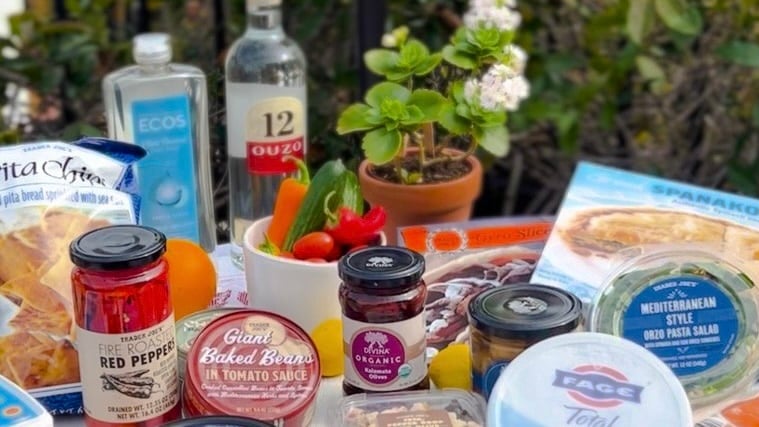
Greek products are going mainstream in the USA, gaining distribution and consumers way beyond the Greek American market. Credit: Michael Andricopoulos/Greek Reporter
Greek products are going mainstream in the USA gaining distribution and consumers way beyond the Greek American market.
In major supermarkets, one can find a wide variety of Greek products such as olive oil, yogurt, feta cheese, gyros, and Greek pies nowadays.
For example, in a Los Angeles supermarket, there is a huge selection of Greek foods. This was unimaginable just a decade ago. One can now buy tzatziki, ouzo, Greek dressings, halloumi, Greek chickpeas, baked beans, olive paste, and pita bread to mention just a few. A whole shopping basket can be filled with Greek products.
Why Greek foods are gaining popularity in the USA
One of the reasons why Greek products are becoming increasingly popular in the US market is that Greek cuisine has become more popular in recent years thanks to its fresh, healthy ingredients and flavorful dishes.
Additionally, there is greater interest in Greek culture nowadays, resulting in more people seeking out Greek products. American consumers are also increasingly interested in genuine products from around the world. Greek products are considered high quality and authentic, making them attractive to US consumers.
Finally, Greek products are increasingly available in the United States, thanks to an improved distribution network.
When the US food scene was shaped by Greek products
One of the pioneers that shaped the US food scene is Grecian Delight/Kronos Foods, established over forty years ago when Peter Parthenis Sr. started up a new Mediterranean food company in Greektown, Chicago.
Today, his creation, headed by his son, Peter Parthenis Jr., has expanded enormously, and Grecian Delight is once again changing the food game in the United States.
The 45-year-old entrepreneur expanded the business into more than 185 Greek, Mediterranean, and Middle Eastern products moving towards a healthier and even plant-based variety of offerings.
According to Parthenis Jr., food trend analysis on products, specifically gyros and other Greek and Mediterranean products, shows that they are still in the growth stage in the US food market, meaning that there is ample room for increased demand for consumers that are interested in protein-based products.

Grecian Delight and Kronos CEO Peter Parthenis Jr. with his father and Grecian Delight Founder Peter Parthenis Sr. Credit: GD
He explains that there are four sections of the cycle of consumer demand: “There’s the beginning, which is inception when it begins really ethnic and small, and then there’s adoption, when people start to pick up and start buying it. Then there’s proliferation, when its becoming mainstream, and then the last stage is ubiquity, which is when you can find it anywhere,” Parthenis Jr. says.
“Greek food, and specifically gyros, is in the stage right before ubiquity. It’s in the mainstream. We still see strong demand, and we have a projection of growth for the next ten years,” he said.
“You look in the fridge and you can find milk, cheese, eggs, that are products in ubiquity. You can find them anywhere,” he added. Parthenis Jr.’s long-term goal is to make his products household staples.
Greek wine is becoming sought-after
Other Greek products that are becoming increasingly popular in the USA are honey, mastiha, and wine. Greek wines have made a spectacular entry into the hospitality sector in the US and Florida in particular with better quality products and improved distribution.
Thanks to the efforts of Cretan entrepreneur George Merlemis, Greek wines are becoming sought-after, not only in Greek but also in American restaurants, too. Merlemis, who operates some of the best Greek restaurants in South Florida, started the import and distribution business of Greek wines just a few years ago.
“There has been a renaissance of the Greek vineyard in the last 25 years,” he told Greek Reporter recently. “We improved the distribution and capitalized on the trend for Greek wines.”

George Merlemis was interviewed by a local reporter about Greek wines at his Taverna Opa restaurant in Hollywood, FL. Photo supplied.
Merlemis, who operates Taverna Kyma, Taverna Opa, and Giorgio’s Bakery in Florida, is educating Americans on Greek wines and Greek hospitality. “Greek food is very popular in the US. Recently, restaurants with Greek food have been opened by foreigners. Greek cuisine does not have many techniques, but it is the repository of the material. Good materials, good raw materials,” Merlemis told Greek Reporter.
He said that the “tip of the spear” of Greek wine penetration in the US market was the Assyrtiko from Santorini. A white grape native to Santorini, Assyrtiko produces crisp, mineral wines with citrus and white fruit flavors.
Moschofilero is another favorite with grapes growing in the area of central Peloponnese, producing a dry, crispy white wine that is full of aromas. Agioritiko and Malagouzia are also excellent varieties that are being imported by Merlemis.
The Greek entrepreneur says that Greek red wines are also making progress in the US market, especially Xinomavro, a red wine grape of the uplands of Naousa in the regional unit of Imathia and around Amyntaio in Macedonia.
Greek foods and cuisine taught at US university
Greek cuisine was recently introduced as a standalone program at the University of Nevada, Las Vegas (UNLV) which announced the establishment of the National Hellenic Society Culinary Legacy Fund to promote Hellenic heritage, culture, and cuisine to culinary arts students.
Master Chef Diane Kochilas, the star of My Greek Table, said she was thrilled to have the opportunity to teach the college’s hospitality students about wellness and other benefits associated with the Greek Mediterranean diet in several classes held over two days at the institution.
The initiative for the program belonged to The National Hellenic Society (NHS), which plans to help bring other chefs, culinarians, and experts who would impart their insights into the Greek Mediterranean diet, culture, traditions, and lifestyle to students.
As the demand for Greek products continues to grow, it is expected that even more Greek products will become available to US consumers in the years to come.

Dining and Cooking